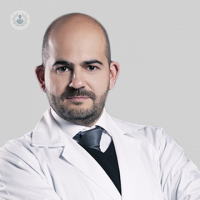Addictions and Psychiatry: the patient's recovery from the autonomy and differentiation
Written by:Addictions are disorders of human behavior can generate a malaise in all vital areas of the person who lives prey to the same. Although not much is yet known about the specific pathogenesis of addictive disorders, dependency disorders or substance use (so as they are often called, a professional level), it is accepted by the scientific community that not all people potentially exposed to the consumption of psychoactive substances or repetitive behaviors such diseases develop but due to a multicausal result that responds to the vulnerability-stress model-coping.

This means that the interaction of intrinsic factors (innate and genetic vulnerability) and extrinsic factors (aspects related experiences, education, maturational development, coping with stress and exposure to certain stimuli). Therefore, it is considered that a vulnerable person to suffer from an addictive disorder remains a risk all their lives, whether different factors are aligned in relation to a potentially pleasurable stimulus (substance or behavior).
As mentioned above, addictions can be considered diseases of the person who not only come into play organic and psychological part of being human, but extends beyond the individual and permeating their different areas of operation, how to handle in life and their way of relating to the world. Just this opening to the outside, its effects and its consequences is what makes the prognosis and long - term recovery and defines the multidisciplinary and integrative approach the person with addiction needs during different phases of treatment.
To what point it is considered that a behavior is addictive?
The sequence of development of addiction is very similar in different individuals, the difference is in the time it takes to settle each of the development phases.
The first phase is the pleasant spot consumption there is no impact on the individual and it has some control to choose when and where carries exposure to potentially pleasurable stimulus or substance.
The second phase is considered inertia. At present there is a repeated exposure, phenomena of tolerance and dependence in which control has fallen into evidence appear but the consequences are minimal. Precisely in this state people recognize the existence of well - being and pleasure more subdued than in the previous phase and often do not know why they do it and there is some need for a replay in consumption and a false sense safety and being able to stop eating when you want ".
The third phase is addiction itself. It at this point seeking behavior becomes frequent, repetitive, obsessive and uncontrollable. There comes a time when the person is not able to stop addictive behavior because it generates significant discomfort on a personal level and repetition becomes irresistible to avoid so -called "negative reinforcement" such as: anxiety, fear, insomnia, irritability, obsessiveness ... symptoms that appear when the person is not consuming the substance or addictive behavior making. At this stage, 24 hours a day thinking of the person revolves around consumption or the possibility thereof.
Common Addictions
The most common addictions are still those deriving from the consumption of substances, especially alcohol, snuff (nicotine), cocaine and cannabis. Behind them are other illegal drugs, with upturns in incidence of drug design and heroin.
At the level of other substances, found increased incidence in self - administration of drugs group tranquilizers benzodiazepines and analgesics morphic derivatives, which can generate phenomena of dependence and tolerance dose escalation easy. For this reason these drugs require strict supervision by the health professional.
On the other hand, we find behavioral additions. The best known is compulsive gambling, with other behavioral addictions, such as addiction to new technologies, work, sex, compulsive shopping, etc.. Precisely in this type of repetitive behaviors, the boundary between addiction and compulsion is diffuse, since in such people are often the coexistence of other concomitant mental disorders behavioral repetitive behavior.
Help psychiatric treatment in addenda
The expert in psychiatry , as a professional health practitioner has the key role of:- Assess the signs and symptoms.- Make recommendation to request additional evidence as analytical and neuroimaging.- Evaluate the medical effects of the substances consumed.- Conduct a reliable diagnosis of addictive disease or other emotional disorders or psychiatric disorders.- Define the most efficient and individualized therapeutic interventions for each patient, according to their evolutionary time.
The psychiatrist needs a team of professionals from other disciplines and other areas of knowledge with experience in dealing with addictions, such as the psychologist, occupational therapist, nursing or social worker. The aim is to create a link and a stable therapeutic relationship with the patient and their immediate environment that is capable of generating a state of prolonged abstinence and make a displacement of addictive behavior toward healthier behaviors to ensure differentiation and patient autonomy .
Recommended therapy in addressing addictions
Medical and psychological approaches used in addiction should move away from absolute positions and therapeutic nihilism. For many years it seemed that in the treatment of addictions everything worth or useless. It is neither one nor the other. To ensure a good outcome of patients with addiction it is necessary to identify the real needs of the patient and assess their evolutionary status and real exchange rate assumption. Thus, the professional must foster a transparent, honest and objective coping by the whole team, including patients, family and professionals alike. It is necessary for the treatment and therapies have proven effective and is most appropriate in each patient recovery stages, working towards autonomy and accountability in a climate of trust and maximum commitment.
Edited by Patricia Crespo Pujante


